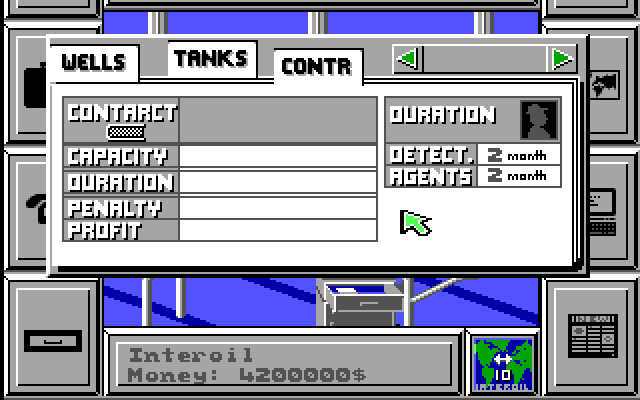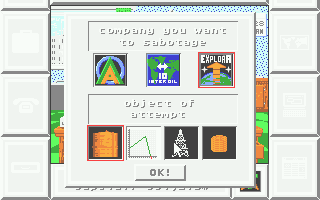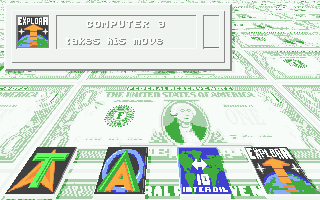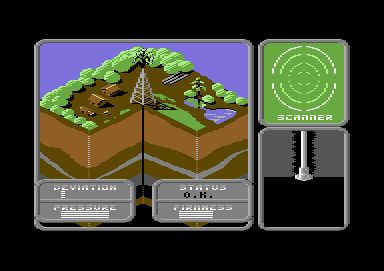Retro Replay Review
Gameplay
Black Gold casts you as the head of one of four rival oil companies vying for supremacy in a cutthroat global marketplace. You spend the bulk of your time buying and selling oilfields, negotiating contracts, and watching the fluctuating world price of crude. Each match starts with a choice of one of four overarching goals—whether it’s hitting the market leaderboards in three years or methodically crushing every competitor for total domination. This framework gives each session a clear objective and pacing, and you can tailor your strategy to either rapid expansion or slow, methodical growth.
(HEY YOU!! We hope you enjoy! We try not to run ads. So basically, this is a very expensive hobby running this site. Please consider joining us for updates, forums, and more. Network w/ us to make some cash or friends while retro gaming, and you can win some free retro games for posting. Okay, carry on 👍)
Underneath the high-level trading system lies a host of dirty tricks you can employ to sabotage your opponents. From firing missile barrages that ignite their rigs to enlisting private investigators who can plant evidence or prove your rivals’ transgressions, there’s ample room for corporate espionage. Stealing storage tanks or blackmailing your foes adds an extra layer of tension—every decision to spend resources on sabotage means fewer funds for exploration and development.
While Black Gold is primarily a board-style strategy game, it spices things up with bite-sized action sequences. When you drill for oil manually, you switch to a first-person minigame where timing and precision determine whether you strike black gold or bust out. Building or rerouting pipelines invokes a spirited construction challenge that threads your piping through dangerous terrain and over your opponent’s lines. You’ll even don a firefighter’s helmet when your rigs are ablaze, chasing down flames in a fast-paced, joystick-driven segment.
These minigames are optional—hiring specialists spares you the effort but at a hefty cost that most fledgling companies can’t afford early on. This push-and-pull between hands-on control and delegation adds meaningful risk/reward decisions to every turn. Whether you’re facing off against human rivals in hot-seat or testing your mettle against the AI, the combined macro-management and punchy micro-challenges give Black Gold a distinctive strategic flavor.
Graphics
Graphically, Black Gold opts for a clean, isometric presentation that clearly conveys resource nodes, rigs, pipelines, and terrain features. The global map highlights oilfield locations with easily readable icons, and color-coding distinguishes each company’s assets at a glance. Animations—such as derricks bobbing up and down when a field produces or a flare of fire when sabotage succeeds—bring the board to life without overwhelming your strategic view.
The user interface is functional, with tabbed menus for finance, field management, and corporate espionage tools. While some windows feel a bit cramped—especially the ledger screens tracking oil prices and expenses—the overall layout remains intuitive. Tooltips explain each action’s cost and effect, helping newcomers get up to speed, though veterans may find the presentation somewhat spartan by modern standards.
Action sequences showcase more detailed sprite work, from the jagged silhouettes of drilling bits to the flickering tongues of pipeline-width fires. The firefighting minigame in particular leverages simple particle effects to simulate smoke and sparks. These bursts of visual flair help differentiate the strategic core from the hands-on interludes, even if the graphics aren’t pushing any hardware limits.
Story
Rather than following a scripted narrative, Black Gold weaves its story through emergent events and the rivalries you cultivate. Each match becomes its own tale of corporate intrigue: one round you might broker a peace treaty with an AI opponent before unceremoniously torching their rig the next. Private investigators and back-room deals supply cutscenes and news headlines that give flavor to each dirty maneuver you make.
The four distinct victory conditions also serve as narrative backdrops. Chasing a rapid market-share goal feels like a high-stakes sprint for Wall Street dominance, whereas total domination unfolds as a decades-long saga of boardroom betrayals and hostile acquisitions. Random events—such as sudden price spikes due to Middle Eastern instability or environmental protests that temporarily shut down offshore platforms—add suspense and lend the world a sense of dynamic realism.
While there’s no central cast of characters or linear storyline, the game’s mechanics deliver a strong thematic thread: the lengths to which corporations will go to secure the planet’s most coveted resource. If you’re seeking an epic plot with protagonists and villains, you might be disappointed. But if you relish crafting your own tale of greed, sabotage, and high-stakes deal-making, Black Gold excels at fueling your imagination.
Overall Experience
Black Gold is a compelling hybrid of board-style strategy and light action, offering a breadth of strategic choices rarely seen in corporate simulations. The core loop of bidding on fields, drilling, and undercutting rivals stays engaging throughout multiple playthroughs. The optional minigames punctuate the macro gameplay with adrenaline-spiking challenges and make each oil strike feel like a personal victory.
On the flip side, the dated graphics and occasionally clunky interface may feel off-putting to players accustomed to polished modern UIs. The learning curve is also on the steeper side, thanks to overlapping systems for finance, espionage, and field operations. Multiplayer matches can run long, and the AI sometimes exploits loopholes or misses obvious opportunities—but these quirks often lead to memorable, laugh-out-loud moments.
Ultimately, Black Gold offers a unique twist on strategy gaming by placing corporate warfare front and center. It’s a must-try for fans of economic sims and anyone intrigued by the drama of the oil industry. If you’re ready to outwit your opponents through boardroom deals by day and pipeline skirmishes by night, this rugged, high-tension title delivers plenty of black-gold-fueled thrills.
 Retro Replay Retro Replay gaming reviews, news, emulation, geek stuff and more!
Retro Replay Retro Replay gaming reviews, news, emulation, geek stuff and more!









Reviews
There are no reviews yet.